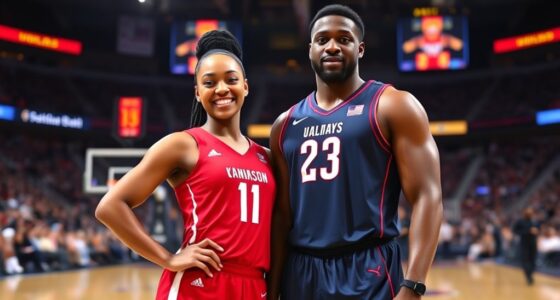When fans cross the line from admiration to fixation, celebrities' safety and well-being are compromised. Aggressive incidents, including phone throwing and physical assaults, have led to concerns about artists' security. Unhealthy obsessions have resulted in stalking, harassment, and invasive behavior, blurring the boundaries between admiration and obsession. Incidents involving Bebe Rexha, Drake, and Harry Styles have highlighted the dangers of overzealous fans. Understanding the risks associated with blurred boundaries is important for creating a safer environment. As the lines between fandom and obsession continue to blur, the significance of setting clear boundaries and respecting celebrities' personal space becomes increasingly essential, and exploring this complex issue further reveals the complexities of fan culture and its consequences.
Key Takeaways
• Celebrity scandals often involve unhealthy obsessions, stalking, and harassment, blurring the lines between admiration and obsession.
• Fanatical behavior can lead to aggressive incidents, compromising artists' safety and mental health, and necessitating increased security measures.
• Setting boundaries is crucial for celebrities to maintain their well-being, as enthusiastic fans can quickly cross the line from admiration to harassment.
• Social media amplifies parasocial relationships, enabling intense emotional connections and fostering a sense of mentorship and admiration between fans and celebrities.
• Instances of fan misconduct, such as stage crashing and physical assaults, underscore the need for clear boundaries and increased security measures to protect artists.
Fanatical Behavior and Its Consequences
Fanatical behavior towards celebrities has led to a disturbing trend of aggressive and violent incidents, including phone throwing, stage crashing, and physical assaults. This behavior has resulted in inappropriate fan interactions, where musicians have been grabbed, hit by objects, or choked during performances. Such misconduct has raised concerns about artists' safety, well-being, and the necessity for increased security measures.
The consequences of fanatical behavior extend beyond the performers, creating a potentially unsafe environment at concerts and events. Additionally, the mental health of celebrities is also at stake, as they face challenging interactions with fans. Setting boundaries is essential for celebrities to maintain their safety and mental health.
It's vital for fans to understand that their idols are human beings who deserve respect and personal space. By recognizing the consequences of fanatical behavior, we can work towards creating a safer and more respectful environment for both celebrities and their admirers.
Unhealthy Obsessions and Celebrity Scandals

Celebrity scandals involving unhealthy obsessions have led to disturbing incidents of stalking, harassment, and invasive behavior, compromising the safety and well-being of public figures.
These cases often stem from fans' fanatic behavior, which can escalate to alarming extremes, resulting in physical and emotional harm to both parties involved.
As a consequence, the boundaries between admiration and obsession become increasingly blurred, sparking concerns about the consequences of unchecked fan behavior.
Celebrity Stalking Incidents
In the blurred lines between admiration and obsession, some fans cross the threshold, escalating their fascination with celebrities into dangerous and often illegal stalking behavior. Celebrity stalking incidents often involve fans crossing boundaries and exhibiting unhealthy obsessions. These incidents can have serious legal consequences and negatively impact both the celebrity's safety and mental well-being.
Stalking behavior can take many forms, including:
- Intrusive behavior: Fans attempting to enter celebrities' homes or following them without consent.
- Threatening messages: Sending explicit or violent messages to celebrities or their loved ones.
- Harassment: Repeatedly showing up at celebrities' workplaces or public events, causing emotional distress.
Instances of stalking have led to restraining orders, arrests, and increased security measures for celebrities. The prevalence of celebrity stalking incidents highlights the importance of understanding and addressing unhealthy fan obsessions.
Fanatic Behavior Escalates
Through the intense scrutiny of social media and public events, some enthusiasts have transformed their admiration into unhealthy fixations, trespassing the boundaries of celebrities' private lives. This fanatic behavior has escalated due to the increased accessibility to celebrities through social media platforms and public events.
Social media, in particular, has facilitated parasocial relationships between celebrities and their fans, blurring the lines between admiration and obsession. As a result, some fans exhibit dangerous behavior, such as sending threats, invading privacy, and engaging in violent acts towards celebrities.
These instances of extreme fanaticism, including stalking, trespassing, and inappropriate contact, have led to numerous celebrity scandals and incidents. The lack of boundaries and the perceived proximity to celebrities on social media have created a false sense of intimacy, leading some fans to believe they've a personal connection with the celebrities. This misconception can have devastating consequences, highlighting the need for fans to respect celebrities' privacy and personal space.
When Admiration Turns to Harassment

When admiration turns to harassment, celebrities often find themselves trapped in a blurring of boundaries, where enthusiastic fans cross the line from admiration to obsession. Unwanted pursuit can manifest in various ways, from aggressive online behavior to physical stalking, leaving celebrities feeling threatened and vulnerable.
As the line between fandom and harassment continues to blur, it becomes increasingly important to examine the consequences of such behavior and the measures that can be taken to prevent it.
Blurred Boundaries
Celebrities often find themselves at the mercy of overzealous fans who cross the line from admiration to harassment, putting their safety at risk. The blurred boundaries between fandom and obsession can have serious consequences. With social media, fans feel more connected to celebrities, but this perceived closeness can lead to a false sense of intimacy.
- Bebe Rexha was hit by a thrown cell phone during a performance, highlighting the dangers of overzealous fans.
- Phone throwing incidents have also endangered artists like Drake and Harry Styles during concerts.
- Fan behavior has escalated to stage crashing incidents, putting artists like Adam Levine at risk.
These incidents demonstrate how easily admiration can turn to harassment. The lack of boundaries between celebrities and fans can have severe consequences, making it essential to establish and respect these limits. By understanding the risks associated with blurred boundaries, we can work towards creating a safer environment for both celebrities and their admirers.
Unwanted Pursuit
Overstepping the boundaries of admiration, fans often blur the lines between enthusiasm and harassment, leading to unwanted pursuit that can have devastating consequences for celebrities.
Unwanted pursuit by fans can manifest in various ways, including stalking, intrusive messages, and uninvited physical contact. These instances of harassment can lead to emotional distress, fear for safety, and legal actions by celebrities.
Fans may feel like they know celebrities on a personal level, but this perceived closeness can lead to a false sense of intimacy, causing them to disregard personal space and privacy. Unwanted behaviors like following celebrities to private locations or sending inappropriate gifts can escalate to serious threats.
The impact of unwanted pursuit on celebrities can range from anxiety and stress to serious security concerns and the need for increased protection measures. Ultimately, it's essential for fans to respect celebrities' boundaries and recognize that admiration should never translate to harassment.
Fan Entitlement and Celebrity Boundaries

How do fans' perceptions of ownership and familiarity with celebrities blur the lines between admiration and aggression, leading to the compromise of celebrity boundaries? The answer lies in fan entitlement, which can lead to fans crossing boundaries by engaging in inappropriate behaviors.
Celebrity boundaries are often compromised when fans exhibit aggressive behaviors like stage crashing or physically grabbing artists during performances. This can lead to instances of fan misconduct, highlighting the challenges celebrities face in maintaining their safety and well-being in the public eye.
Here are three key takeaways:
- Fan behavior towards musicians can range from supportive and respectful to intrusive and harmful, impacting the artists' ability to feel secure in their work environments.
- Setting clear boundaries is essential for artists to establish a safe and professional relationship with their fans, emphasizing the importance of mutual respect in fan-musician interactions.
- Instances of fan misconduct underscore the need for celebrities to set and maintain clear boundaries to safeguard their safety and well-being.
The Blurred Lines of Parasocial Relationships

Through social media, fans develop intense, one-sided emotional connections with celebrities, influencers, or fictional characters, often without realizing the blurred lines between fantasy and reality. This phenomenon is known as parasocial relationships, where fans feel a strong sense of connection and identification with the celebrity, often through social media. Social media platforms have amplified this phenomenon, making it easier for fans to feel connected.
| Characteristics of Parasocial Relationships | Description |
|---|---|
| One-sided emotional connection | Fans develop a strong sense of connection without reciprocation |
| Blurred lines between fantasy and reality | Fans often struggle to distinguish between reality and fantasy |
| Sense of mentorship and admiration | Fans look up to celebrities as role models |
| Amplified by social media | Social media platforms facilitate parasocial relationships |
| Extends beyond entertainment figures | Parasocial relationships also involve religious leaders and gospel singers |
These relationships provide fans with a sense of mentorship and admiration for the celebrities they follow. While they may not be reciprocal, parasocial relationships have become a defining aspect of modern fandom, with social media playing a significant role in their development.
Fan Culture and the Psychology of Idolization

As fan culture continues to evolve, the psychology of idolization has become a driving force behind the intense emotional connections fans form with celebrities, perpetuating a complex web of admiration and dependency. This phenomenon is fueled by social media, which provides a platform for fans to engage with their idols, feel emotionally connected, and become emotionally invested in their lives.
The constant stream of updates, behind-the-scenes glimpses, and personal anecdotes creates a sense of intimacy, leading fans to develop parasocial relationships with celebrities. This can be particularly problematic when fans become overly invested, sacrificing their mental well-being for the sake of their idol.
Here are 3 key factors contributing to the psychology of idolization:
- Social media: Platforms like Instagram and Twitter enable fans to interact with celebrities, fostering a sense of closeness and familiarity.
- Loneliness: Fans may turn to parasocial relationships as a means of coping with feelings of loneliness and isolation.
- Emotional connection: The constant flow of personal content creates a sense of emotional intimacy, leading fans to feel deeply invested in their idols' lives.
Frequently Asked Questions
What Is a Parasocial Relationship Between Celebrities and Fans?
Celebrities and fans develop parasocial relationships, characterized by one-sided emotional connections. Fans form attachments to celebrities despite lack of real interaction, often through social media. This leads to a sense of connection and investment in celebrities' lives, making fans feel personally connected to their successes.
These relationships can intensify through social media, fostering a deep emotional investment in celebrities' well-being.
What Is an Obsessive Fan for Celebrities?
Imagine a fan so enthralled by their celebrity crush that they show up uninvited to their home, convinced they share a deep connection.
This blurred reality is characteristic of an obsessive fan for celebrities, who exhibit intense, unhealthy devotion and fixation.
They may stalk, harass, or intrude upon their idol's life, struggling to differentiate between fantasy and reality, ultimately posing a threat to both their own well-being and the celebrity's safety.
What Is a Parasocial Relationship in Stan Culture?
In stan culture, a parasocial relationship refers to a one-sided emotional attachment fans form with celebrities, influencers, or fictional characters.
Fans develop a strong identification and sense of connection with the celebrity, often feeling a mentorship and admiration towards them. This attachment leads to increased engagement through online interactions, providing fans with a sense of connection and familiarity with the celebrity.
What Are the Negative Effects of Celebrity Culture?
Celebrity culture's dark underbelly is littered with the remnants of shattered lives, as fame's pressures fuel mental health struggles, substance abuse, and privacy invasion. Fans' unrealistic fantasies about celebrities' lives foster negative self-comparisons and feelings of emptiness.
The toxic phenomenon of celebrity worship contributes to cancel culture, further eroding mental well-being. A balanced perspective on fame and individuality is essential to mitigate these detrimental effects.
Conclusion
As the spotlight shines bright on celebrities, it can create a firestorm of fanatical behavior, blurring the lines between admiration and obsession.
Like a moth to a flame, some fans get too close, ignoring the boundaries of their idols. The consequences can be devastating, leading to scandals, harassment, and even violence.
As the saying goes, 'absolute power corrupts absolutely,' and the intense scrutiny can corrupt even the most well-intentioned fans, leaving celebrities to navigate the treacherous landscape of fandom.










